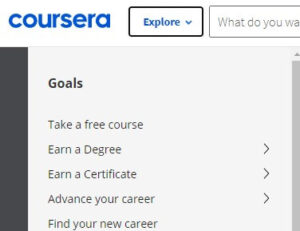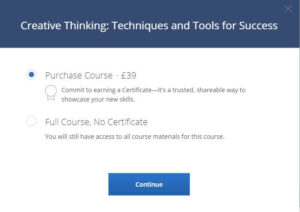
Coursera is one of the largest online learning platforms providing the digital learning environment for over 275 universities and education providers to deliver and manage online courses, from free short certificate courses to complete master’s degrees and everything in between.
Courses are open to anyone with a computer and internet connection. As an organisation, Coursera believes that learning is the source of human progress and has the power to transform the world.
Created by Stanford University computer science professors Daphne Koller and Andres Ng to provide online courses for Stanford in 2011. Coursera is one of the original MOOCs- Massive open online classrooms. In 2012 it launched with the addition of courses from the University of Michigan, the University of Pennsylvania and Stanford. Since then, it has continued to innovate online learning and, as of September 2022, has 113 million registered learners.
There are currently seven UK universities that provide courses on the Coursera platform.
Currently, the 7 UK universities offer 93 short courses on the platform and a range of undergraduate and postgraduate degrees. Coursera has also patterned with the UK-based Digital Marketing Institute to offer ten courses on digital marketing.
When a university partners with Coursera, they work together to turn the university’s academic content into a rewarding learning experience. Coursera helps university teams and academics to create engaging online courses by providing evidence-based advice on what works for online study.
The Coursera platform provides data-driven tools to universities to track students’ engagement and learning outcomes providing insights on student progress and behaviour that are used to improve program performance and student satisfaction.
Coursera has over 175 University partners delivering 4,400 courses and 490 Specializations, 39 certificates and 33 undergraduate and postgraduate degrees.
When on the Coursera platform, finding each type of course and understanding how they differ can be overwhelming due to the number of options available. To help, we have ordered the different learning options below based on the time needed to complete them.
Guided projects are short practical courses designed around specific work skills, such as google sheets and software development. Currently, there are nearly 750 guided projects available on the platform.
They take under two hours to complete and are one of the cheapest options for study on Coursera, starting at £8 a course or as part of a Coursera Plus subscription. Unfortunately, there are no free options available for Guided Projects.
Courses on Coursera take between 4 and 12 hours to complete. They have a free option that gives you access to all the materials and lectures but have some limitations. On a free course, students do not have access to any graded assignments and do not receive a certificate upon completion.
Depending on the course, you will get graded assignments and feedback from a tutor when you pay. You will also earn a certificate that you can share and add a LinkedIn profile. You can purchase a course individually or as part of a Coursera Plus subscription.
Coursera specializations are a series of related courses that are taken one after the other and build up a robust understanding and mastery of the topic. Specializations vary from as little as three courses, taking a few months, to ten or more separate courses requiring a year of study.
After completing the set courses, students undertake a capstone project- a final graded assignment- to be awarded the specialization. Examples of capstone projects could be creating an original web or mobile application or producing a marketing strategy or business plan. Once completed, students receive a specialization certificate in addition to the individual course certificates.
You can start and try a specialization for free. However, to take the entire course and gain the certification, the cheapest option is to subscribe to a Coursera Plus subscription for the length of the Specialization.
Professional certificates are similar to specializations in that they consist of a series of courses that a student takes, and upon completion, they are awarded the professional certificate.
Depending on the professional certificate, students may need to complete the courses in a specific timeframe or achieve a set grade for the certificate to be awarded. In addition, organisations and other schools may recognise professional certifications.
These courses take several months to complete and provide the skills in demand by businesses and provide industry-recognised learning outcomes.
A master’s track certificate from Coursera allows students to take part of a master’s degree without committing to the entire programme. These courses combine live lectures and asynchronous learning. Students have access to course facilitators and support teams.
There is no entry requirement or application for a master’s track certificate, unlike a complete master’s degree. If a student is accepted onto the complete Master’s, the credits they earnt on the Master’s track count towards their degree. Currently, only US universities are offering Master’s Track certification.
You can take a full undergraduate or postgraduate degree through the Coursera platform. These courses take several years to complete, with the certificate awarded directly from the university.
For these full academic qualifications, you need to submit an application that needs to be accepted by the university before you are offered a place on the course.
While Coursera provides an excellent learning environment with courses from top universities and academics, the mixture of course types and pricing can be daunting- there is a mixture of free, free trials, individual course pricing and subscription options to navigate.
Generally, the costs are higher for courses with live sessions, graded assessments and access to dedicated tutors and support teams. The most expensive courses offered by Coursera are the full degrees and Master’s courses that carry academic credits. At the other end of the costs spectrum, you can access thousands of courses for free but with limitations.
Below, we have broken down the costs by course type to help you understand the cost commitments.
Coursera offers free access to thousands of courses, and you can get a 7-day free trial for thousands more. But there are limitations on the free options. You cannot access tutor-graded assignments and will not be awarded a certificate when you complete the course.
The easiest way to find the free courses is to start your search using the explore box on the top right, select the take a course for free section, and then narrow down your search by subject area.

When you join a course, you will be given the option below. You can access all the material for free, but you will not get a certificate that you can share and add to LinkedIn, for example.

You can get seven days of free access to most courses available to purchase individually or included with a Coursera subscription. This is a great option to find out if the course is right for you before committing to it financially.
However, to get access, you need to enter your card payment details to start the free trial, and you will be charged on day eight if you do not cancel within seven days.
All courses on Coursera can be purchased on an individual basis. The costs range from as little as £8 for a guided project to the tens of thousands for a full Master’s degree.
Coursera Plus is a monthly or yearly subscription that gives unlimited access to thousands of eligible courses. All courses, Guided Projects, Specializations, and Professional Certificates from UK Universities are included in Coursera Plus. All courses included in Coursera PLus have this logo on their course page.
| Courses | Start from £31 |
| Guided Projects | Start from £8 |
| Specialisations |
7-day free trial start from £47 per month
|
| Professional Certificates |
7-day free trial start from £47 per month
|
| Master’s Track Certificates | Start from £2,000 |
| Undergraduate Degrees | Start from £9,000 per year |
| Postgraduate Degrees | Start from £9,000 per year |
We partner with education providers to help students like you make informed choices, and we sometimes earn commission from affiliate links on the site.
Use these links to view the full rankings (Opens in a new window)
ARTU Ranking (Out of 45 UK universities included in their table)
QS World University Rankings- QS Quacquarelli Symonds rankings data– (CC BY-NC-ND 4.0)